#絹本
Explore tagged Tumblr posts
Photo

A small painting on silk canvas. 葉っぱの黒い斑点模様が面白いと思っていたけど、これはどうやら病気でこうなってるらしい。 少し怒る柿の葉 (2021) "A little angry persimmon leaf" 2021 akiramiyamoto.com fb.com/AkiraMiyamotoArt instagram.com/moto_hawk #アート #akiramiyamoto #fineart #art #artist #artwork #contemporary #contemporaryart #arte #kunst #japaneseart #creative #draw #drawing #painting #silkpainting #絹本 https://www.instagram.com/p/CmonN9DLE85/?igshid=NGJjMDIxMWI=
#アート#akiramiyamoto#fineart#art#artist#artwork#contemporary#contemporaryart#arte#kunst#japaneseart#creative#draw#drawing#painting#silkpainting#絹本
4 notes
·
View notes
Text



9月の終わりに着物を着る予定なので、コーディネートを考えてみたよ!晴れますように!
半衿は墨流し。着物がシンプルだから、花柄とかでもいいかなと思ったんだけど、こちらの方が合う感じでした。この半衿は、もう何年も前に染め体験で作ったの。もちろん初めてやったし、思ったようにできなくて残念な気持ちだったの。ピンクが出過ぎなのよ!でもちょうど水色が着物と合ってる。
帯はかわいいお花柄。テーマは香風花だって。それにあわせて、蝶柄の帯留め。こちらはアンティークの薩摩ボタンを帯留めにしたものです。帯締めは真っ黒じゃなくて少しだけシルバーになってて、それが濃い色一色よりもいい感じでした。帯揚げもその少しだけのシルバーにあわせてシルバーで、着物の矢絣の一色ともあうかな。
そして、海老柄の長襦袢〜。見せたいくらい。と思って、表に出して撮影(๑˃̵ᴗ˂̵)元々は羽裏柄として描いたものらしい。京都��型友禅です。
13 notes
·
View notes
Text

8 notes
·
View notes
Text
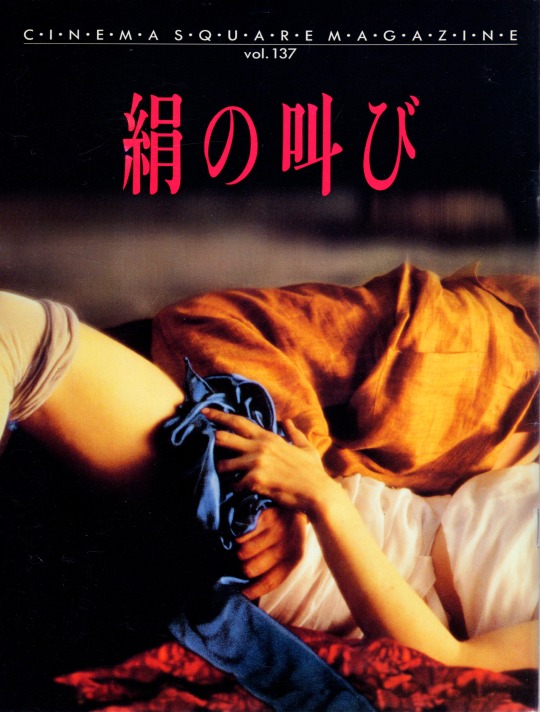
絹の叫び Cinema square Magazine No.137 シネマスクエアとうきゅう 監督:イヴォン・マルシアノ/出演:マリー・トランティニャン、セルジオ・カステリット、アネモーヌ ほか
#Le Cri de la soie#絹の叫び#Cinema square Magazine#Cinema square#Yvon Marciano#Marie Trintignant#マリー・トランティニャン#Sergio Castellitto#Anemone#anamon#古本屋あなもん#あなもん#映画パンフレット#movie pamphlet
7 notes
·
View notes
Text
instagram
0 notes
Text

水木しげる先生の生誕100周年「ゲゲゲの鬼太郎」初のトリビュートアート展『鬼太郎EXPO』 に出展しました。 https://kitaro-expo.com
#illustration#イラスト#coverart#advertising#painting#artwork#art#ゲゲゲの鬼太郎#鬼太郎#水木#水木しげる#illustrator#illustrative art#日本画#絹本着彩#ジャケット#広���
0 notes
Text
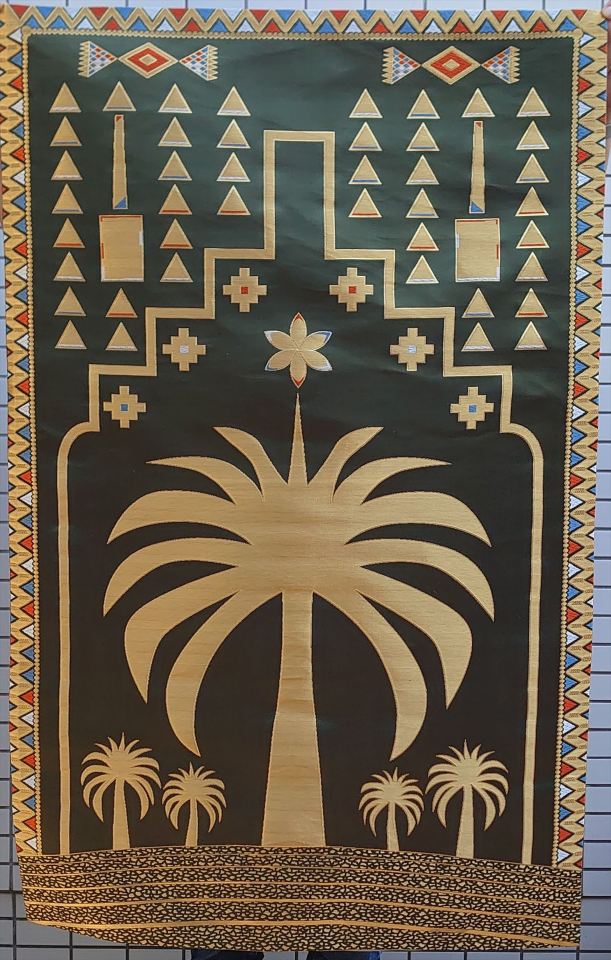
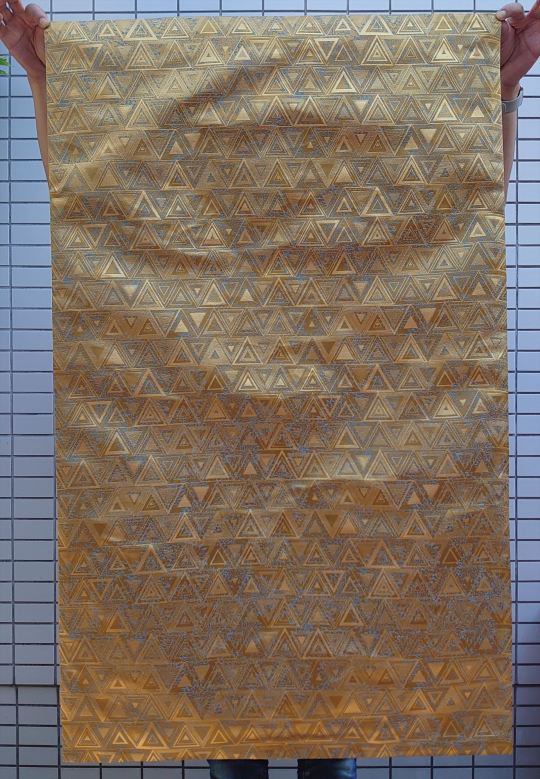
Exhibiting at INDEX Saudi Arabia
・Event Name: INDEX Saudi Arabia | 10 – 12 September 2023 | Saudi Arabia’s Interiors Trade Show
・Date: 10th September 2023 - 12th September 2023
・Venue: Riyadh Front Exhibition & Convention Center
・Booth Number: Stand No. 4E420
INDEX Saudi Arabia | Saudi Arabia’s Interiors Trade Showへ出展のお知らせ
・日程:2023年9月10日 – 9月12日
・会場:Riyadh Front Exhibition & Convention Center
・ブース番号:Stand No. 4E420
https://okamotoorimono.com/news/index-saudi-arabia2023/
#traditionalcraftsmanship#西陣岡本#職人#絹#伝統工芸#nishijinokamoto#gorgeous#gold#京都#西陣織#kyoto#nishijin#silk#saudiarabia#Riyadh#contemporarydesign#silkfabrics#japan
1 note
·
View note
Photo

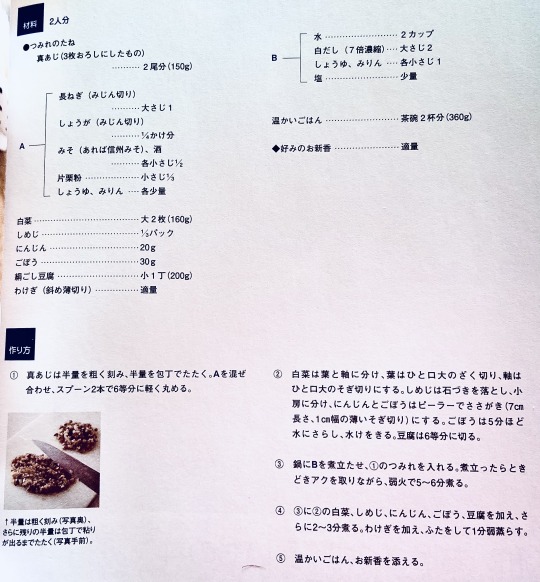
✿ 真あじの手仕込みつみれ鍋定食 ✍️ イワシ缶使用。この方法だとつみれにならない。
#cook:真あじの手仕込みつみれ鍋定食#cook:つみれ#cook:真あじ#cook:あじ#cook:真鯵#cook:鯵#cook:魚#cook:主菜#cook:主菜:魚#cook:いわし缶#本:大戸屋 にっぽんの定食レシピ#cook:白だし#cook:醤油×白だし×味醂#cook:ごほう#cook:はくさい#cook:絹ごし豆腐#cook:豆腐#cook#2020〜
0 notes
Text
✨ Hetalia characters as famous paintings ✨


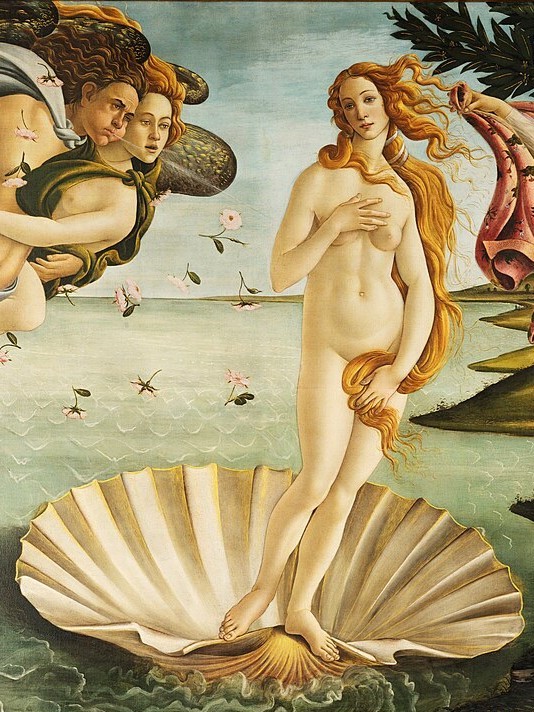
Italy: Sandro Botticelli, La nascita di Venere (The Birth of Venus)


America: Grant Wood, American Gothic


Germany: Albrecht Dürer, Selbstbildnis im Pelzrock; Feldhase (Self-Portrait in Fur-Collared Robe; Young Hare)


England: Thomas Gainsborough, The Blue Boy


France: Claude Monet, La Femme à l'ombrelle — Madame Monet et son fils (Woman With A Parasol - Madame Monet And Her Son)


Japan: Hishikawa Moronobu, 見返り美人図 (Beauty Looking Back)


Russia: Ivan Kramskoi, Неизвестная (Portrait of an Unknown Woman)


China: Unknown, 百人物像 冊 絹本 (One hundred portraits of Peking opera characters) (special thanks @maibluemen for helping me with this one!)
#aph england#aph america#aph russia#aph germany#aph italy#aph france#aph china#aph japan#hetalia#Riva.edit#I know I’m not the first one to make this post but I wanted to make it for a while and finally got around to it when I needed a distraction#for the night so I’m posting it too#I have another merch art thing saved with more cakes that I want to identify too#these are a lot of fun 😇#hws england#hws america#hws france#hws china#hws russia#hws japan#hws italy#hws germany
995 notes
·
View notes
Photo

今夜2022/11/15は #天然真鯛のソテーオレンジソース と #絹豆腐の厚揚げと小松菜の洋風だし煮 に しました(^o^) #男子ごはん部 #おうちごはん #おうちごはん男子部 #ぶんのごはん #桑名市 #桑名 #kuwana #三重県 #三重 #mie #日本 #japan https://www.instagram.com/p/Ck-3bNGJNc7/?igshid=NGJjMDIxMWI=
0 notes
Photo
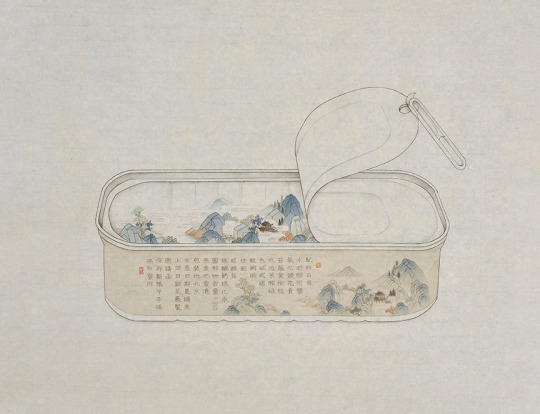
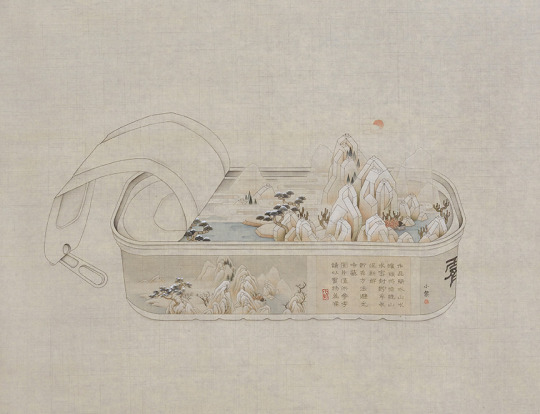
Zhang Xiaoli(张小黎 Chinese, b.1989)
1. A Can of Landscape I 罐頭山水Ⅰ 2. A Can of Landscape II 罐頭山水Ⅱ 2017 設色絹本 60 x 70cm each via
2K notes
·
View notes
Photo

What should I see next year. 寝るときに見える抽象的な?映像みたいなのは何なんだろう。何かの情報を整理しようとしてるのかな? "See the sound" 2021 akiramiyamoto.com fb.com/AkiraMiyamotoArt instagram.com/moto_hawk #アート #akiramiyamoto #fineart #art #artist #artwork #contemporary #contemporaryart #arte #kunst #japaneseart #creative #draw #drawing #painting #silkpainting #絹本 https://www.instagram.com/p/CmwKaH2rwal/?igshid=NGJjMDIxMWI=
#アート#akiramiyamoto#fineart#art#artist#artwork#contemporary#contemporaryart#arte#kunst#japaneseart#creative#draw#drawing#painting#silkpainting#絹本
0 notes
Text
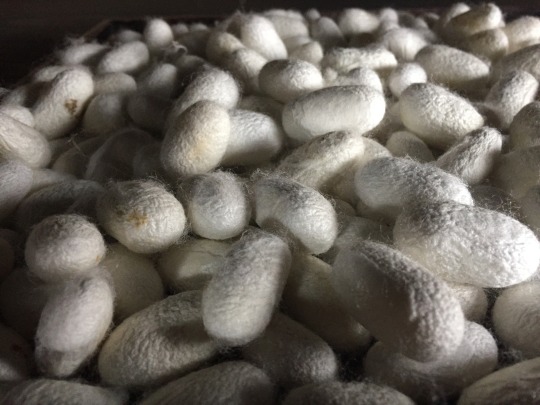
noteからの翻訳です。日本語の方はぜひ末尾のリンクから向こうへ。
The silkworm makes a cocoon to protect itself when it becomes a pupa. The length of the thread that is ejected while swinging its head in a figure eight motion is said to be as long as 1,300 meters or more. 1,300m or even longer in some varieties.
The raw silk I usually use to weave kimonos is a thin, fine thread, and those threads I usually use to weave kimonos is made by twisting 10 strands of 7-grain yarn. In other words, it is the thickness of 70 cocoons.
When drawing raw silk, cocoons are boiled and the protein (sericin), which is like glue that holds the yarn together, is broken down and drawn out. The figure of eight(8) is the secret to prevent tangling in the middle.
So. we could find a silkworm or moss after we pull and take a long thread from inside. (They will not become adult silkworms, though, because they are boiled.
Raw silkworms can be boiled, or the amount of work required to take the thread from them is limited. Recently, we have been drying, freezing, salting (salting method), and steaming (steaming method), etc., to produce raw silk. In short, it is necessary to prevent the silkworms from leaving their cocoons as adult worms.
Because …silkworms first hatch in cocoons, but they have to make a hole in the cocoon they made themselves to get out.
For the time being, they finish their transformation into the form of a moth inside and tear the skin of their chrysalis, the silkworm then breaks through the chrysalis skin and expels an enzyme called cochonase, which is produced in the organ called the bird's crop sac.
The moth then breaks through the chrysalis skin, and exhales an enzyme called cochonase, produced in the organ called the bird's craw sac, to soften the sericin at the exit, then emerges from the chrysalis by pushing its way through the threads.
Furthermore, when it comes out, it also produces urine, or water, which is called "moth urine". and coloured and stains the inside of the cocoon. The rest is the skin of the shed pupa, which also sticks to the inside of the cocoon.
The silkworms hatch and the quality of the cocoons changes,
The quality of the cocoon changes and raw silk cannot be obtained. The enzyme does not break the thread itself, but the cocoonase is alkaline, so it does not do much damage to weakly acidic fibres.
However, cocoonase is alkaline, so there is no small amount of damage to weakly acidic fibres. Nevertheless, at least some of the silkworms have to be made into adult worms, because the silkworm eggs for the next cycle cannot be obtained.
The cocoons from which raw silk was not obtained, and the rest from disease, or the cocoons that did not produce raw silk, cocoons that were too small because of disease or poor growth, and so on.
It is Japanese culture not to waste such things. The cocoons are boiled, the sericin in the paste is broken down, and the pupal skin is removed as much as possible, and the result is cotton-like material known as "mawata".
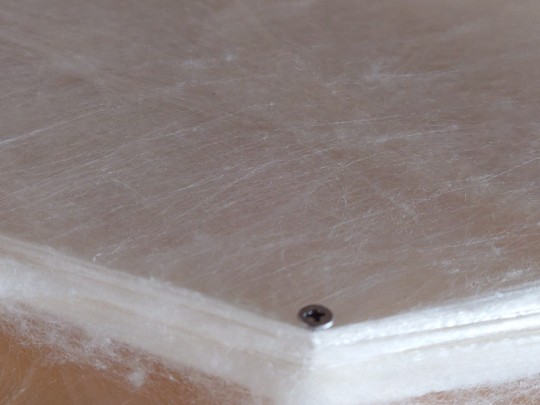
Mawata sheets
The "tsumugi" thread is made by stretching and twisting the cotton, either by pulling it out or twisting it, or neither, or both. Then, fabrics woven using the tsumugi thread is called tsumugi weaving.
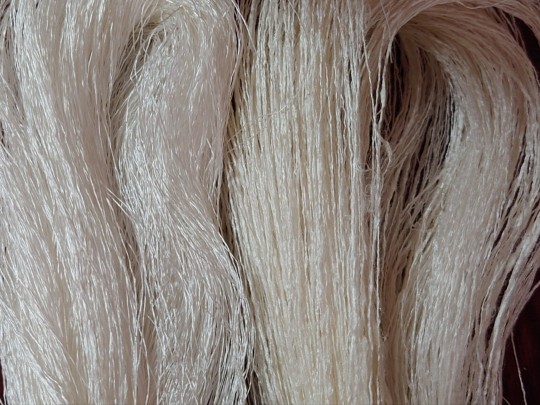
The left is raw silk and the right is tsumugi yarn spun by myself.The texture is different. Such is the case even with purchased products.
To be precise, the silkworm's thread is called "kibiso"
The silkworm's thread is made up of three parts: the beginning part, called kibiso ; the long, long raw silk part; and the end part, called "bisu".
Both kibiso and bisu have different textures from raw silk, and sometimes only these parts are collected and sold as separate yarns.
The beginning of the spit is still unstable and the end is the residue of the body, so in essence, I have heard that they are made slightly differently...In the case of the easily recognisable coloured silkworm cocoons, the hard yellow-green outer part is the kibiso,
The bis has a light yellow-green raw silk part inside, and the bis is slightly yellowish white.)
The bisu ends up looking leathery and unravelling…
Those different textures remain in the mawata, so, even if you try to stretch them out homogeneously, it is sometimes impossible to do so. That is the true nature of the knots that remain in the silk threads.
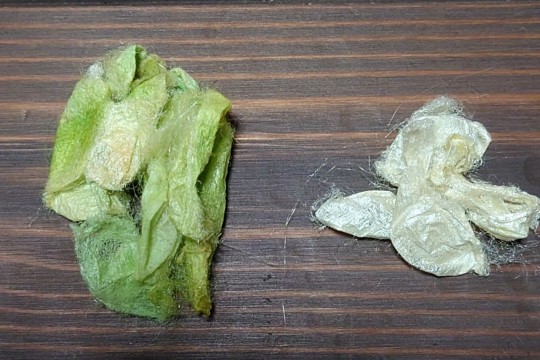
Kibiso (left) and bisu (right) of wild silkworms.(Silkworms ones do not peel so much)
In the end, what I wanted to say was that thread is a gift of life,I think it is lovely that the thread is born out of such a sense of waste.
581 notes
·
View notes
Text
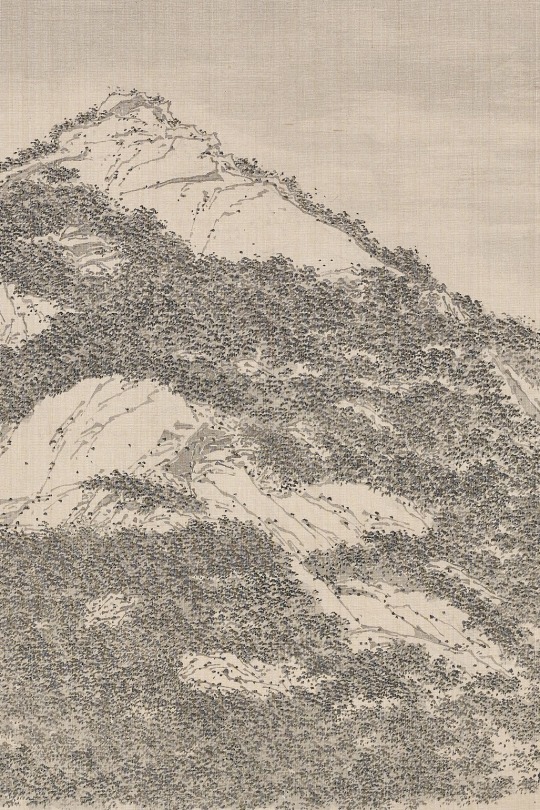
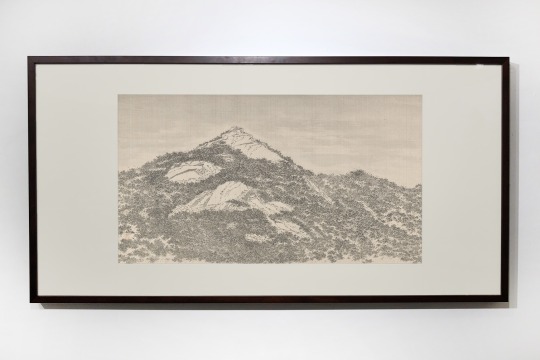
PiaoPiao & 畫庫
【 佛巖山 】(局部)諸賢模|80 x 45 cm|絹本水墨設色|2022
【Foyan Mountain】(detail) Models of Zhu Xian|80 x 45 cm|Ink and color on silk|2022
45 notes
·
View notes
Text
突然更新、
「やぎさん」編です……。
前中後編の結構ながいお話です。相変わらず普通にエロ漫画なんで要要要注意。
現代の価値観ではまったくよろしくない表現が何箇所かあるけども、有難いことに編集部が「ここで自主規制なんかしたらこの漫画を発表する意味が無い」と力強く言って下さった 明るい志津摩が必死に隠していた複雑で暗い感情の渦、少しでも勘違いされずに伝わったらよいなと思います。
ここまで描けたの奇跡的、描き始めた時は本当自分が人でなしに思えすぎて怒られるのが怖すぎて精神的にキツかった、今もやっぱりキツい
みんなが読んでくれたおかげ、熱すぎるコメントたくさんくれたおかげ…ありがとうございます。もうちょっと頑張るね。
148 notes
·
View notes
Text
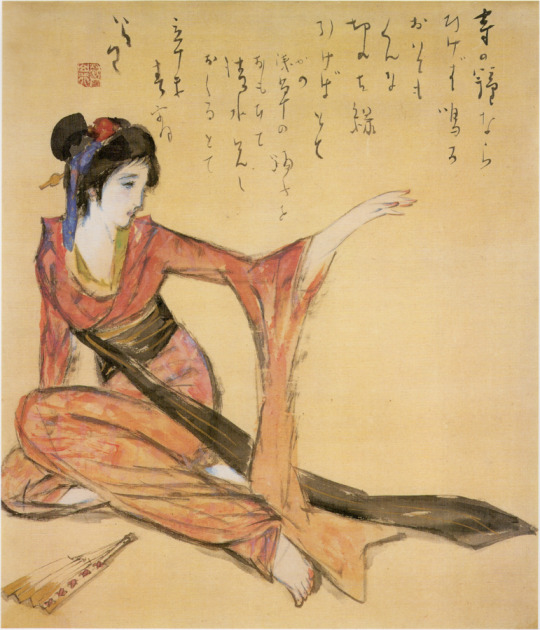
Yumeji Takehisa 1931 "Woman of Asakusa" / Colouring on silk
"If it's a temple bell, ring it when you strike it. Don't stay there, don't return. If you pull it, it will ring." I rememberd the dancer of Asakusa And I send it to my brother Shimizu. Kanoto-hituji-syun-syou (1931 Spring Night) from Musei (Alias Yumeji Takehisa)
Asakusa has flourished as the gate town of Senso-ji Temple since the Edo period, In the Meiji era (1868-1912), it flourished as a popular entertainment district. Asakusa was a town of the common people, where Japanese and Western culture, human karma, good and evil, love and hate swirled together, Yumeji was particularly fond of Asakusa, a town of the common people where Japanese and Western culture, human deeds, good and evil, love and hate swirled together, and went there frequently. The dancer's untied sash, her outstretched hand, and her sad gaze are all pointing towards a place that fascinates her. The fan in her lap suggests that the broken ties will never return. The fan at her knees suggests that a broken bond will not return.
竹久夢二 「浅草の女」
昭和6年(1931)/絹本着色 寺の鐘なら ひけば鳴ろ おいてもくんな 切れた縁 引けばとて かの浅草の踊子をおもひて 清水兄におくるとて 辛未春宵 夢生
江戸時代から浅草寺の門前町として栄えた浅草は、 明治になり大衆歓楽街として盛況を呈しました。 和と洋の文化、人間の業・善悪・愛憎が渦巻いた庶民の街浅草を、 夢二は殊の外好み、度々出掛けたといいます。 踊り子の解けて流れた帯、さしのべた手、悲しげな視線は 心惹かれる先へと向かっていますが、切れた縁は再び戻らないこ とを膝元の扇は暗示しています。
24 notes
·
View notes